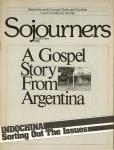"We seek the human desert where there is lacking the substance of Life...In such places God's grace awaits us. It is in such places that we are asked to live the adventure of God's fellowship, and sent by the church, to give witness." - From "On the Road to Where?" a pamphlet by Brother Peter Raphael
In the desert of Algeria Charles de Foucauld met the Lord. While at a Trappist monastery in the dry, barren land of Syria he became aware of the vast human desert of the poor and he knew his life must be lived with them and for them. "I love our Lord," he said, "and I cannot bear to lead a life different from the one he led....Like Jesus of Nazareth: charity toward the people who live here...and humility in my way of life, a humble, poor, hidden home." Finally, in 1916, while he was in the desert of Tamanrasset, living with nomads, he was assassinated.
He left behind a vision for life among the poor that Rene Voillaume brought to fruition in the founding of the Little Brothers of Jesus, and the related Little Brothers of the Gospel, in 1933, and the Little Sisters of Jesus in 1939. The purpose of the order is to live among the poor as Jesus did, and to be the friend of everyone, the universal brother and sister, the "littlest one." Their life is simple. They own no property, but choose to live in tenements in New York City, shanty towns in Venezuela, villages in India. They hold menial jobs: cleaning rooms in a hotel, waiting on tables in a restaurant, welding in a factory, driving a delivery truck.
The silence of the desert profoundly impressed Foucauld and molded his life of prayer. He found prayer to be an opening of his own interior desert to the one who is the Living Water and his soul found life and refreshment to sustain him in his arduous calling.
Prayer remains a focal point of the Little Brothers and Sisters. In the midst of the noise, confusion, and squalor of the cities or villages they live in, they maintain a certain desert silence in their own lives. It is a silence of being still before God, of being alone with him even though surrounded by people, a communion between his spirit and yours.
Each fraternity, as their living groups are called, maintains a chapel, and here the life of their fellowship is sustained. Prayer becomes for them a joining together of their souls to search for the loving knowledge of God and a lifting up of the needs of the poor around them.
Hospitality is a natural part of their lives. They seek to be the neighbor to the needy, and help in whatever way they can. Brother Peter Raphael, in his pamphlet, "On the Road to Where?" says simply, "The Little Brothers is a place where people come and go. It's a little place but it holds everything."
They don't try to institute any great social reforms, they work with the people they live among and seek to serve them. Raphael said, "We could have defined excellent goals and designed wonderful projects, but we would have had to reckon with the poverty and powerlessness which is at the heart of our Brotherhood-- ourselves...We have the precious gift of being free from the need to succeed."
They do not choose to be a political force either. Their life is that of the poor and the poor have little power in a world controlled by the wealthy. Unintentionally they have become a threat to different governments because their sympathies are with the oppressed and not the oppressors. By their very life they denounce the powers of the state.
The threat they have become is all too evident in Latin America. Brother Arturo Paoli established the first South American community in 1959, the Brotherhood of Fortin Olmos in Argentina.
Since 1974 there have been at least 15 arrests, attacks, or deportations of the Little Brothers or their close associates. Three of those arrested, Fathers Gazzarri, Silva, and Bustos, are still missing.
Last July the Little Brothers decided to close the remaining fraternity in Argentina; it had become impossible for them to serve the poor in that country. There are 14 countries in which they continue to live and work, sharing the living water of their souls with the desert of humanity.
Sharon Miller lived in Christ's Community, Grand Rapids, MI, and was living at Sojourners and working on the magazine when this article appeared. She hopes work in South Asia soon.

Got something to say about what you're reading? We value your feedback!
